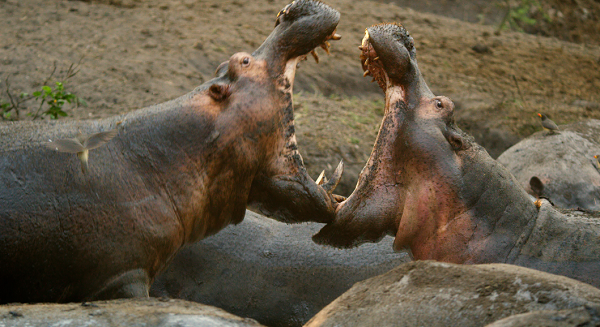
The effects of climate change have seemingly never been more apparent than now. Glaciers are melting. Sea levels are rising about one-eighth of an inch a year, according to the National Ocean Service, and ocean temperatures are warming up too. Coral reefs are dying across the globe at rapid rates. Plant species are blooming earlier or later than usual—in some cases, not at all—and the seasons don't appear to be following traditional schedules.
Across the planet, animals have been forced to alter their habits and their habitats as they try to survive in areas that are changing more quickly than ever. Viewers will soon get a firsthand view on just how struggle-some adapting to the many (and constant) environmental changes has been for some species when Nat Geo premiere's its newest Mother Nature series, Hostile Planet, on Monday.
"Being a polar bear 50 years ago when this genre of natural history and film started has nothing to do with what a polar bear is today, because in those 50 years this planet has evolved quicker than the last 6 million years. It's ridiculous what's happened within the last five decades," Guillermo Navarro, Hostile Planet's executive producer, told Newsweek.
Tom Hugh-Jones, Martha Holmes and Delbert Shoopman also executive produced the series along with Bear Grylls, who serves as Hostile Planet's narrator.
Unlike the nature docuseries of the past that simply used images to illustrate text, Hostile Planet is a distinctive, and sometimes unsettling, glimpse into the way animal behavior has transformed from their perspective. With little narration, cutting-edge technology and lenses planted in jungles, grasslands, oceans, deserts, mountains and polar landscapes, the crew was able to capture the plight animals face it's occurring to them. Simply put, this is nature's account of survival on the ever-changing planet told from nature's dynamic and awe-inspiring point of view.
"What I was very adamant to do here was to bring ingredients of that dramatic narrative and use the film language to build stories. As opposed to just capturing images, we put the lens where it needed to go and created a sequence with an emotional arch," Navarro said. "So you build a relationship with the animal and you connect with it."
He added: "You're not just learning by what's going on with the planet, you're experiencing it. It's a much more immersive experience."
Over the course of six episodes, viewers will get to understand how animals attempt to survive amid changes to their environments, whether it be by having to behave more aggressively, migrate sooner than usual or change locations altogether. More importantly, though, Hostile Planet will give people the chance to see the role and impact they've had on animals.
"It's not only climate, its many things [affecting the animals]. We were able to tell animal stories that put that in evidence, so you can see what's happening," Navarro said. "Humans have to understand this planet also belongs to the animals. They're doing their part surviving, and we have to do our part in keeping things going. For that, you have to create the awareness—in a very profound sense—that this planet is for all of us. It doesn't belong only to us."
Hostile Planet premieres on the Nat Geo channel on Monday at 9 p.m. ET.
Uncommon Knowledge
Newsweek is committed to challenging conventional wisdom and finding connections in the search for common ground.
Newsweek is committed to challenging conventional wisdom and finding connections in the search for common ground.
About the writer
Michigan native, Janice Williams is a graduate of Oakland University where she studied journalism and communication. Upon relocating to New ... Read more
To read how Newsweek uses AI as a newsroom tool, Click here.








